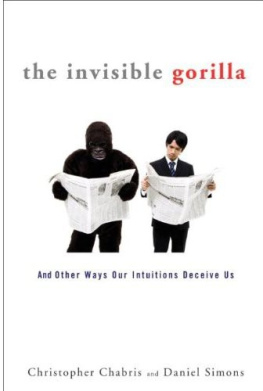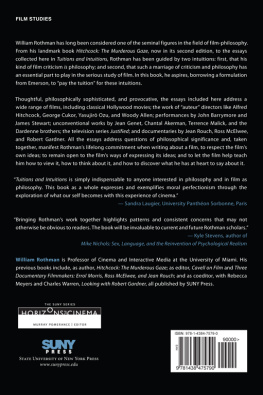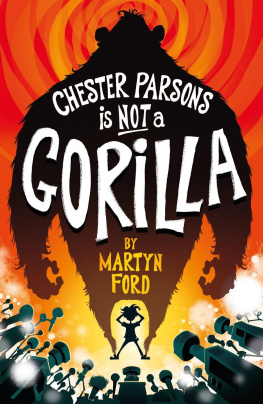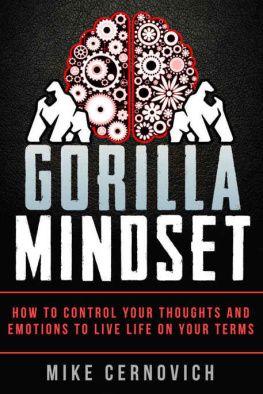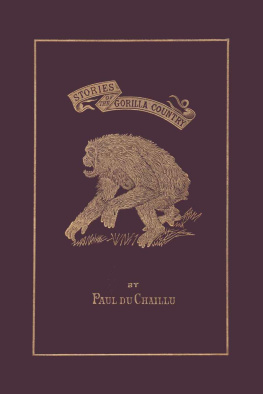Christopher Chabris - The Invisible Gorilla: And Other Ways Our Intuitions Deceive Us
Here you can read online Christopher Chabris - The Invisible Gorilla: And Other Ways Our Intuitions Deceive Us full text of the book (entire story) in english for free. Download pdf and epub, get meaning, cover and reviews about this ebook. year: 2010, publisher: Crown Archetype, genre: Detective and thriller. Description of the work, (preface) as well as reviews are available. Best literature library LitArk.com created for fans of good reading and offers a wide selection of genres:
Romance novel
Science fiction
Adventure
Detective
Science
History
Home and family
Prose
Art
Politics
Computer
Non-fiction
Religion
Business
Children
Humor
Choose a favorite category and find really read worthwhile books. Enjoy immersion in the world of imagination, feel the emotions of the characters or learn something new for yourself, make an fascinating discovery.
- Book:The Invisible Gorilla: And Other Ways Our Intuitions Deceive Us
- Author:
- Publisher:Crown Archetype
- Genre:
- Year:2010
- Rating:3 / 5
- Favourites:Add to favourites
- Your mark:
- 60
- 1
- 2
- 3
- 4
- 5
The Invisible Gorilla: And Other Ways Our Intuitions Deceive Us: summary, description and annotation
We offer to read an annotation, description, summary or preface (depends on what the author of the book "The Invisible Gorilla: And Other Ways Our Intuitions Deceive Us" wrote himself). If you haven't found the necessary information about the book — write in the comments, we will try to find it.
The Invisible Gorilla: And Other Ways Our Intuitions Deceive Us — read online for free the complete book (whole text) full work
Below is the text of the book, divided by pages. System saving the place of the last page read, allows you to conveniently read the book "The Invisible Gorilla: And Other Ways Our Intuitions Deceive Us" online for free, without having to search again every time where you left off. Put a bookmark, and you can go to the page where you finished reading at any time.
Font size:
Interval:
Bookmark:
More Praise for
the invisible gorilla
Should be required reading by every judge and jury member in our criminal justice system, along with every battlefield commander, corporate CEO, member of Congress, and, well, you and me because the mental illusions so wonderfully explicated in this book can fool every one of us.
Michael Shermer, publisher of Skeptic magazine, monthly columnist for Scientific American, and author of Why People Believe Weird Things
A breathtaking and insightful journey through the illusions that influence every moment of our lives.
Richard Wiseman, author of Quirkology: How We Discover the Big Truths in Small Things
Not just witty and engaging but also insightful. Reading this book wont cure you of all these limitations, but it will at least help you recognize and compensate for them.
Thomas W. Malone, author of The Future of Work and founder of the MIT Center for Collective Intelligence
Everyday illusions trick us into thinking that we seeand knowmore than we really do, and that we can predict the future when we cant. The Invisible Gorilla teaches us exactly why, and it does so in an incredibly engaging way. Chabris and Simons provide terrific tips on how to cast off our illusions and get things right. Whether youre a driver wanting to steer clear of oncoming motorcycles, a radiologist hoping to spot every tumor, or just an average person curious about how your mind really works, this is a must-read.
Elizabeth Loftus, PhD, Distinguished Professor, University of CaliforniaIrvine, and author of Memory and Eyewitness Testimony
An eye-opening book. After reading The Invisible Gorilla you will look at yourself and the world around you differently. Like its authors, the book is both funny and smart, filled with insights into the everyday illusions that we all walk around with. No matter what your job is or what you do in life, you will learn something from this book.
Joseph T. Hallinan, Pulitzer Prizewinning author of Why We Make Mistakes
Cognitive scientists Chris Chabris and Dan Simons deliver an entertaining tour of the many ways our brains mislead us every day. The Invisible Gorillais engaging, accurate, and packed with real-world examplessome of which made me laugh out loud. Read it to find out why weathermen might make good money managers, and what Homer Simpson can teach you about thinking clearly.
Sandra Aamodt, PhD, coauthor of Welcome to Your Brain and former editor, Nature Neuroscience
Wonderfully refreshingThe Invisible Gorillamakes us smarter by reminding us how little we know. Through a lively tour of the brains blind spots, this book will change the way you drive your car, hire your employees, and invest your money.
Amanda Ripley, senior writer, Time magazine, and author of The Unthinkable

There are three things extremely hard: steel, a diamond, and to know ones self.
Benjamin Franklin, Poor Richards Almanack (1750)
A BOUT TWELVE YEARS AGO, we conducted a simple experiment with the students in a psychology course we were teaching at Harvard University. To our surprise, it has become one of the best-known experiments in psychology. It appears in textbooks and is taught in introductory psychology courses throughout the world. It has been featured in magazines such as Newsweek and The New Yorker and on television programs, including Dateline NBC. It has even been exhibited in the Exploratorium in San Francisco and in other museums. The experiment is popular because it reveals, in a humorous way, something unexpected and deep about how we see our worldand about what we dont see.
Youll read about our experiment in the first chapter of this book. As weve thought about it over the years, weve realized that it illustrates a broader principle about how the mind works. We all believe that we are capable of seeing whats in front of us, of accurately remembering important events from our past, of understanding the limits of our knowledge, of properly determining cause and effect. But these intuitive beliefs are often mistaken ones that mask critically important limitations on our cognitive abilities.
We must be reminded not to judge a book by its cover because we take outward appearances to be accurate advertisements of inner, unseen qualities. We need to be told that a penny saved is a penny earned because we think about cash coming in differently from money we already have. Aphorisms like these exist largely to help us avoid the mistakes that intuition can cause. Likewise, Benjamin Franklins observation about extremely hard things suggests that we should question the intuitive belief that we understand ourselves well. As we go through life, we act as though we know how our minds work and why we behave the way we do. It is surprising how often we really have no clue.
The Invisible Gorilla is a book about six everyday illusions that profoundly influence our lives: the illusions of attention, memory, confidence, knowledge, cause, and potential. These are distorted beliefs we hold about our minds that are not just wrong, but wrong in dangerous ways. We will explore when and why these illusions affect us, the consequences they have for human affairs, and how we can overcome or minimize their impact.
We use the word illusions as a deliberate analogy to visual illusions like M. C. Eschers famous never-ending staircase: Even after you realize that something about the picture as a whole is not right, you still cant stop yourself from seeing each individual segment as a proper staircase. Everyday illusions are similarly persistent: Even after we know how our beliefs and intuitions are flawed, they remain stubbornly resistant to change. We call them everyday illusions because they affect our behavior literally every day. Every time we talk on a cell phone while driving, believing were still paying enough attention to the road, weve been affected by one of these illusions. Every time we assume that someone who misremembers their past must be lying, weve succumbed to an illusion. Every time we pick a leader for a team because that person expresses the most confidence, weve been influenced by an illusion. Every time we start a new project convinced that we know how long it will take to complete, we are under an illusion. Indeed, virtually no realm of human behavior is untouched by everyday illusions.
As professors who design and run psychology experiments for a living, weve found that the more we study the nature of the mind, the more we see the impact of these illusions in our own lives. You can develop the same sort of x-ray vision into the workings of your own mind. When you finish this book, you will be able to glimpse the man behind the curtain and some of the tiny gears and pulleys that govern your thoughts and beliefs. Once you know about everyday illusions, you will view the world differently and think about it more clearly. You will see how illusions affect your own thoughts and actions, as well as the behavior of everyone around you. And you will recognize when journalists, managers, advertisers, and politiciansintentionally or accidentallytake advantage of illusions in an attempt to obfuscate or persuade. Understanding everyday illusions will lead you to recalibrate the way you approach your life to account for the limitationsand the true strengthsof your mind. You might even come up with ways to exploit these insights for fun and profit. Ultimately, seeing through the veils that distort how we perceive ourselves and the world will connect youfor perhaps the first timewith reality.
Next pageFont size:
Interval:
Bookmark:
Similar books «The Invisible Gorilla: And Other Ways Our Intuitions Deceive Us»
Look at similar books to The Invisible Gorilla: And Other Ways Our Intuitions Deceive Us. We have selected literature similar in name and meaning in the hope of providing readers with more options to find new, interesting, not yet read works.
Discussion, reviews of the book The Invisible Gorilla: And Other Ways Our Intuitions Deceive Us and just readers' own opinions. Leave your comments, write what you think about the work, its meaning or the main characters. Specify what exactly you liked and what you didn't like, and why you think so.

